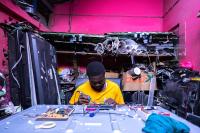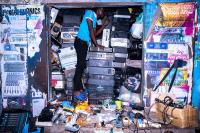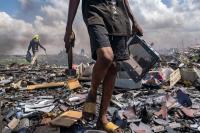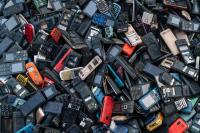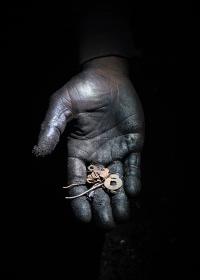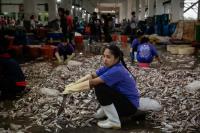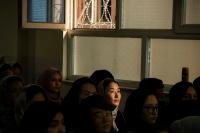13° Edition
Ghana: Following our E-Waste
A collaborative report by Anas Aremeyaw Anas, Muntaka Chasant and Bénédicte Kurzen.
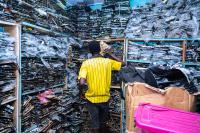
Ghana, Accra, Zongo Lane, Spring 2023.
Zongo Lane is like an Alibaba cavern. Hundreds of small shops for all types of electronics components, modules, and general parts populate the narrow streets of this old Accra neighborhood. Ghanaians, but also Nigerians work here. it also used to be the marketplace for Used and Waste Electrical and Electronic Equipment (UEEE) coming from Europe but the narrow streets were not allowing all the containers to park and offload without creating a complicated traffic situation. While in Europe the independent repairers have almost disappeared, an entire economic ecosystem survives on this craft.
© Bénédicte Kurzen for Fondation Carmignac / NOOR
62 million tons. This is the volume of electrical and electronic waste - discarded battery- or mains-powered products, commonly known as «e-waste» - generated worldwide in 2022, according to the latest Global E-Waste Monitor Report published by the United Nations.
The number of smartphones, connected watches, flat screens, computers and tablets being thrown away continues to rise (82% increase since 2010), making them not only one of the world’s biggest sources of waste, but also the most valuable (containing precious metals like gold, silver and platinum group metals). According to the study, if this trend continues, in the absence of sustainable recycling or repair solutions, global electronic waste will reach 82 million metric tons by 2030. In 2022, of the 62 million tons of e-waste, only 22,3 % were collected and recycled in a dedicated channel.
Having long invaded Asia (Russia, India, China, etc.), e-waste from Europe and the United States is arriving in extensive quantities in the ports of West African countries such as Ghana, in violation of international treaties. A country renowned for its political stability and respect for a multi-party system, Ghana is faced with the proliferation of informal open-air landfill sites even closer to homes, after the dismantling of the Agbogbloshie scrapyard site in July 2021.
The Award of the 13th edition was granted to a team made up of investigative anti-corruption journalist and activist Anas Aremeyaw Anas and photojournalists Muntaka Chasant and Bénédicte Kurzen (NOOR).
From February 2023 to February 2024, thanks to the human and financial support of the Fondation Carmignac, the laureates carried out a transnational field study between Ghana and Europe which combines photography, video, audio recordings and writing.
Departing from the dramatic imagery often used by the media to portray Ghana as «the dustbin of the world», they spent a year documenting this incredibly ambiguous and complex ecosystem, which is both a crucial economic opportunity for thousands of people in Ghana and has a considerable human and environmental impact.
Accra, Ghana, spring 2023.
Zongo Lane, an old district of the Ghanaian capital, resembles an Ali Baba's cave with hundreds of small shops selling electronic components, modules and spare parts of all kinds. Broken electronic devices are dismantled and reused.
© Bénédicte Kurzen pour for Fondation Carmignac / Noor.
Together, combining a national and international approach, the team studied the ramifications of e-waste trafficking between Europe and Ghana, revealing the opacity of this globalised cycle.
Delving into the complex world of second-hand electronics in Ghana and Europe, Bénédicte Kurzen documented the e-waste flows and the communities that activate them, challenging negative stereotypes of exporters and highlighting the inefficiency of European e-waste bureaucracy.
At the other end of the chain, in Accra, the capital of Ghana, researcher and documentary photographer Muntaka Chasant immersed himself in a sociological analysis of this economy on which many communities depend. With precision, he analyses the social groups of e-waste workers, revealing a hierarchical organisation and the mechanisms of migration from north-east Ghana.
With his team, Anas Aremeyaw Anas infiltrated the ports of Accra to reveal the legal and illegal flows of e-waste. Working undercover, and using trackers implanted in illegal waste, he unmasks the strategies and corruption that enable people to circumvent the law, both in Europe and in Ghana.
In partnership with the Fondation Carmignac, the United Nations Institute for Training and Research (UNITAR) has co-published with the International Telecommunication Union (ITU) the Global E-waste Monitor, a report on e-waste issues around the world. A reference tool for policy-makers and industry, the Global E-waste Monitor 2024 provides an overview of global e-waste data and statistics, as well as policy and regulatory developments.
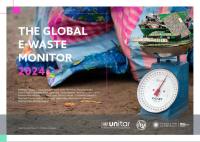
In collaboration with Green Cross, the testimonies of the laureates of the 13th edition have also enriched a publication that sets out the social, environmental and health issues generated by the pollution of our waste sent to Ghana. Structured around 12 proposals, this document is designed to raise the awareness of civil society as well as national and international public authorities to take concrete action.
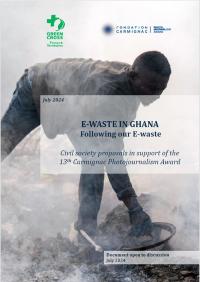
The jury of the 13th edition of the Award was composed of:
Dr Kees Baldé, Senior Scientific Specialist, United Nations Institute for Training and Research (UNITAR)
Fabiola Ferrero, Photojournalist, laureate of the 12th edition of the Carmignac Photojournalism Award
Vera Kwakofi, Senior Commissioning Editor, Africa TV, BBC World Service
Lars Lindemann, Independent curator
Azu Nwagbogu, Independant curator, Director and Founder of African Artists’ Foundation and Lagos Photo Festival
Alona Pardo, Curator, Head of Programmes, Arts Council Collection, UK
The pre-jury:
Fiona Shields, Head of Photography, The Guardian
Mikko Takkunen, Photo Editor International, The New York Times
Marta Weiss, Senior Curator, Photography, Victoria & Albert Museum
Green Cross
Green Cross International, is a network of civil society organisations founded by Mikhail Gorbachev in 1993, dedicated to the environment and humankind. Green Cross France & Territories, the French branch, is presided by Jean Michel Cousteau and directed by Nicolas Imbert. Its primary mission is to respond to the combined challenges of security, poverty and environmental degradation to ensure a sustainable and secure future.
United Nations Institute for Training and Research (UNITAR)
As a dedicated training arm of the United Nations system, the United Nations Institute for Training and Research (UNITAR) provides innovative learning solutions to individuals, organisations and institutions to enhance global decision-making and support country-level action for shaping a better future.




